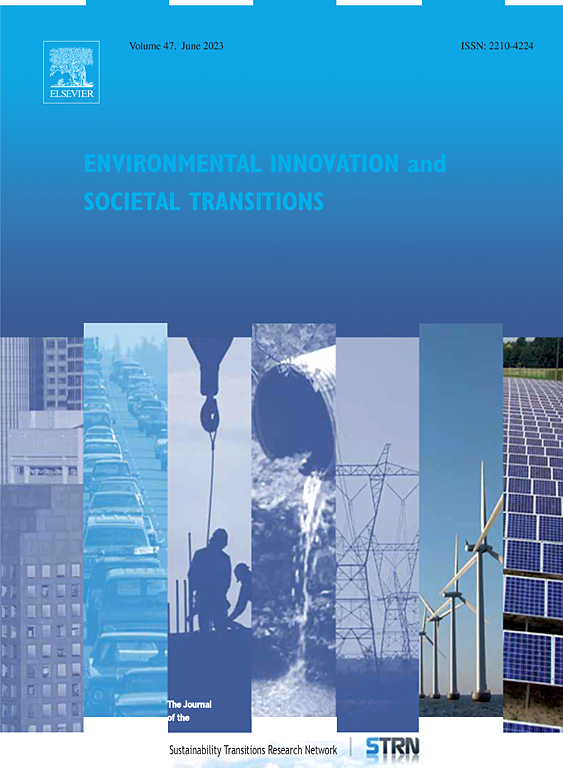Does religious difference have an impact on the diffusion of sustainable innovations? A mixed-methods analysis of ecovillages worldwide
IF 5.7
2区 经济学
Q1 ENVIRONMENTAL SCIENCES
Environmental Innovation and Societal Transitions
Pub Date : 2025-06-25
DOI:10.1016/j.eist.2025.101024
引用次数: 0
Abstract
Religion is seen as potential leverage for sustainability transitions by scholars and other actors. However, so far, little is known about how religion influences the diffusion of sustainable practices. Drawing from a global survey of 130 ecovillages, this mixed-methods study investigates the role of religious difference in the diffusion activities of ecovillages. We integrate survey results with findings from 24 semi-structured interviews. The results show that ecovillages employ self-secularization strategies. Self-secularization strategies enable ecovillages to collaborate with other actors for local sustainability transitions despite differences in religious beliefs and practices. This study is the first to examine the role of religion in the diffusion activities of grassroots groups engaged in sustainability. The results illustrate the potential of religious beliefs and practices to act as barriers and/or catalysts to sustainability transitions.
宗教差异对可持续创新的传播有影响吗?全球生态村的混合方法分析
宗教被学者和其他参与者视为可持续转型的潜在杠杆。然而,到目前为止,人们对宗教如何影响可持续实践的传播知之甚少。基于对全球130个生态村的调查,本研究探讨了宗教差异在生态村传播活动中的作用。我们将调查结果与24个半结构化访谈的结果相结合。结果表明,生态村采用了自我世俗化策略。自我世俗化战略使生态村能够与其他参与者合作,实现当地的可持续性转型,尽管宗教信仰和习俗存在差异。本研究首次探讨了宗教在从事可持续发展的基层团体传播活动中的作用。研究结果表明,宗教信仰和习俗有可能成为可持续转型的障碍和/或催化剂。
本文章由计算机程序翻译,如有差异,请以英文原文为准。
求助全文
约1分钟内获得全文
求助全文
来源期刊

Environmental Innovation and Societal Transitions
Energy-Renewable Energy, Sustainability and the Environment
CiteScore
13.60
自引率
19.40%
发文量
90
审稿时长
56 days
期刊介绍:
Environmental Innovation and Societal Transitions serves as a platform for reporting studies on innovations and socio-economic transitions aimed at fostering an environmentally sustainable economy, thereby addressing structural resource scarcity and environmental challenges, particularly those associated with fossil energy use and climate change. The journal focuses on various forms of innovation, including technological, organizational, economic, institutional, and political, as well as economy-wide and sectoral changes in areas such as energy, transport, agriculture, and water management. It endeavors to tackle complex questions concerning social, economic, behavioral-psychological, and political barriers and opportunities, along with their intricate interactions. With a multidisciplinary approach and methodological openness, the journal welcomes contributions from a wide array of disciplines within the social, environmental, and innovation sciences.
 求助内容:
求助内容: 应助结果提醒方式:
应助结果提醒方式:


